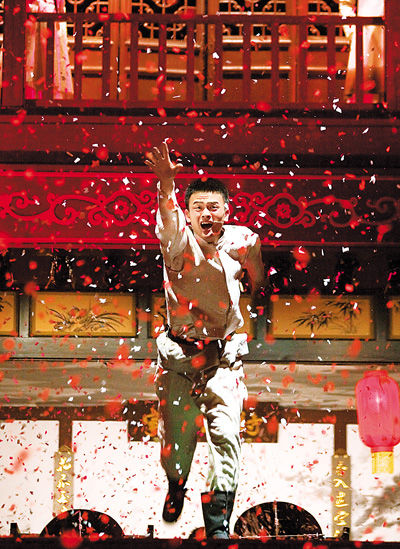

Ancient Pingyao Once More, a drama set in an artificial town, is a creative form of performance representing Pingyao city in the late Qing Dynasty (from the late 19th to the early 20th century). Audiences call it a living drama without a stage.
There is no traditional stage or auditorium. The audience moves with the actors through the town, interacting with them. A highlight is that it provides a diversified sensory experience. Some feel it is like watching a show; others visiting a museum; some believe it to be a firsthand cultural experience; others traveling through time.
The drama is critically acclaimed as the most creative show in the past decade in China. Since its debut on February 18 last year, it has been staged more than 600 times, attracting more than 260,000 visitors.
 |
|
Leading actor, Cheng Fei, stars in Ancient Pingyao Once More. |
A new performing style—touring while watching
"I've never thought to see such a drama", Mr. Zhang, a visitor from Beijing, said, "It's like wandering in the ancient city back a hundred years!"
Mrs. Hu from Shanghai, said the drama inspired her to see Pingyao from a new perspective, "The show made me realize that I've missed lots of cultural essences in my last visit, and I shall tour the city again."
Walking out of the relics of the ancient city gate, you can see the "theatre" with grey tiles located just a hundred meters ahead. It has no traditional entrance or staging hall, just miniatures of an antique architectural complex, setting the grand old town wall as its natural stage background.
The audience enters from a variety of directions, like people pouring into an open city. There are blocks and streets, courtyards, city walls, squares and also Biao Ju (an old establishment that provides escorts for a fee), Piao Hao (ancient currency exchange shop), Pai Lou (a kind of decorated archway), stalls selling silk and fabrics, and pawnshops, which feel like a giant museum of Shanxi merchants in old times.
Streams of people come and go, while tradespeople peddle their wares along the streets, and the sound of children reading keeps coming out of the Si Shu (ancient Chinese private schools). Hundreds of actors play a variety of roles, passing through the "city" together with their audience. You can hardly tell the visitors from the actors were there no difference in their clothing.
Visitors follow the story line by moving from scene to scene. The drama centers on the vicissitudes of the Wang family, who enjoyed a high reputation in martial arts circles in the Qing Dynasty, and ran the prestigious Tong Xinggong Biao Ju in Pingyao. The Biao Ju was established by Wang Zhengqing in 1855. However, later Wang's offspring were arrested by Tsarist Russia, and thus Zhao Yishuo, the protagonist, starts a seven-year journey with 232 escorts before saving the Wang family's bloodline.
The charm of Pingyao lies not only in the ancient architecture, but also in local culture and moral traditions. Wang Chaoge, the director in chief, said she and her team had tried to integrate drama, dancing, photography, music and other factors both traditionally and in a modern way. The team did thorough research of local historical facts before starting to create the play.
Besides enjoying the story, visitors can experience 28 kinds of Shanxi features - such as merchants' bodyguard customs, clan culture, local wheaten food culture and other traditional cultural habits - in four independent zones.
The drama has now become a new identity of Pingyao, judging from its box office popularity. Pingyao Impression Cultural Tourism Co sees the drama as not only a tourism project, but also a spiritual heritage. If the city landscape shows Pingyao history, then the drama displays living habits of local citizens.
A transformation from sightseeing tour to in-depth exploration
The drama perfectly integrates culture and tourism, which promotes more in-depth tourism in Pingyao, and visitors tend to spend more days there. Feng Jianping, director of Shanxi's tourism department, said the success of the drama proves that culture is the soul of tourism development and that they depend on each other. Pursuing beauty as well as knowledge is the ultimate goal of Shanxi tourism.